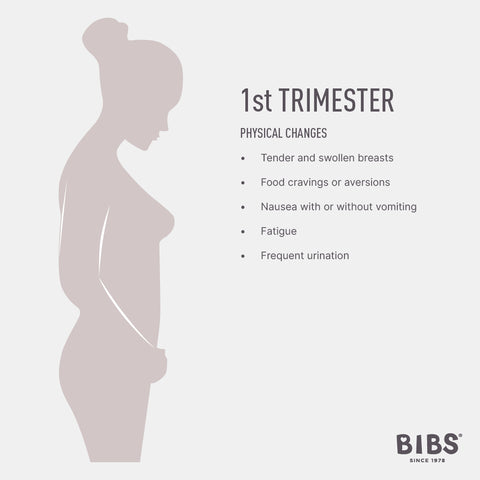Physical and Psychological Changes During Pregnancy

Pregnancy is a transformative journey divided into three trimesters, each marked by unique physiological and psychological changes. From the hormonal overture of the first trimester to the deepening bond in the second, and the final preparations for birth in the third, each trimester has its own story to tell. You may love some changes and feel uncomfortable with others - that’s natural.
To gain deeper insights into this extraordinary process, we have asked midwife Amanda Schneider to guide us through the critical physiological and psychological changes during pregnancy.
1st trimester (1-3 months)
The first trimester of pregnancy, spanning from conception to week 12, marks the initial phase of this transformative journey.

Physical Changes
During the first trimester of pregnancy, a woman’s body undergoes significant changes, which often cause various symptoms. Some of the first-trimester symptoms are:
- Tender and swollen breasts
- Food cravings or aversions
- Nausea with or without vomiting
- Fatigue
- Frequent urination
Nausea is an especially common and often uncomfortable symptom experienced by many expectant mothers. Midwife Amanda Schneider explains, “Nausea occurs due to two different factors: Hormones and a growing uterus. The hormone HCG, in particular, is believed to play a part. The level of HCG is greatest in the 1st trimester, which is why most pregnant women experience nausea here, and the nausea then subsides. Some pregnant women experience nausea returns in the 3rd trimester, and this is because the uterus's growing size presses on the stomach and its contents. You can relieve pregnancy nausea and sickness in different ways: Small frequent meals to keep blood sugar stable, plenty of liquids, acupuncture, or vitamin B12. However, what works varies from woman to woman”.
Psychological Changes
The physiological changes in a woman’s body may also impact her emotions. Midwife Amanda Schneider summarizes, “Hormonal changes can lead to mood swings and heightened sensitivity. It's a rollercoaster of feelings that most women go through. Whether the pregnancy was meticulously planned or a surprise, the journey is life-altering in every sense, and it's not always easy to navigate. Emotions can surge to great heights during this time, and the need for emotional support and reassurance is crucial.”
2nd trimester (4-6 months)
The second trimester of pregnancy is often regarded as the most comfortable time for expectant mothers.

Physical Changes
During the second trimester, a woman's body undergoes noticeable transformations. The uterus expands, and many women start feeling fetal movements. For most women, the uncomfortable nausea that may have plagued the early weeks of pregnancy decreases, offering some relief. This is also when sleep patterns tend to improve, and energy levels increase.
Yet, as with any chapter of this incredible journey, the second trimester brings its own set of unique symptoms. These may include back pain, abdominal pain, leg cramps, constipation, and heartburn. It's a reminder that while the second trimester may be more comfortable overall, the body's transformation continues, each change bringing its own blend of challenges and joys.
Psychological Changes
As your baby's movements become more pronounced, a mother's bond with her child often deepens. Some women feel overwhelmed by fetal movements, and others love it.
Body shape and size changes can also influence a woman's body image and self-esteem. Midwife Amanda Schneider explains, "It's completely natural for expectant mothers to face complex emotions surrounding their changing bodies during pregnancy. The body changes daily, and it is wonderful if you embrace and love it, but it is also okay if you feel ambivalent about these changes. But know that you are not alone in those thoughts and feelings. Reach out for help if the negative thoughts become too debilitating”.
3rd trimester (7-9 months)
The third trimester marks the last part of the pregnancy journey.

Physical Changes
During this final chapter of pregnancy, you may experience various physical symptoms. These result from your baby's size and position and the strain the expanding uterus places on your body. The most common symptoms during the third trimester are:
- Increased urination
- Shortness of breath
- Heartburn
- Backaches and pelvic pain
- Swelling in the feet, ankles, and hands
- Braxton hick's contractions
- Fatigue
- Stretch marks
- Hemorrhoids
- Sleeping problems
It's important to note that while these symptoms are expected during the third trimester, their severity and duration can vary greatly from woman to woman. If any symptoms are causing significant discomfort or concern, it's recommended to consult with a healthcare provider for guidance.
Psychological Changes
As the due date approaches, emotions surrounding childbirth and your baby's impending arrival may intensify. During the third trimester, expectant mothers often find themselves in a range of emotional states - some may be filled with excitement and positivity about the upcoming birth, while others might experience moments of anxiety. It's important to recognize that these emotional responses are normal and part of the unique pregnancy journey.
Midwife Amanda Schneider highlights, "If you experience anxiety about childbirth, it is important to say it out loud. It can be to a friend or a family member, but most importantly, to one's partner and midwife. By articulating the anxiety and putting it into words, an understanding can be created of what underlies it so that the anxiety can be remedied. If the anxiety is too debilitating, a psychologist and/or therapy may be necessary. Some experience anxiety that is so bad that we, as midwives, cannot help enough, and it is important to be aware of it so that it is taken seriously.”
A last piece of advice for expecting mothers from midwife Amanda Schneider is, “Listen to yourself and know that you are not alone. Pregnancy can be amazing, it can be hard, and it can be a bit of both. No emotion is forbidden. Take care of yourself and your baby because you are the most important.


















